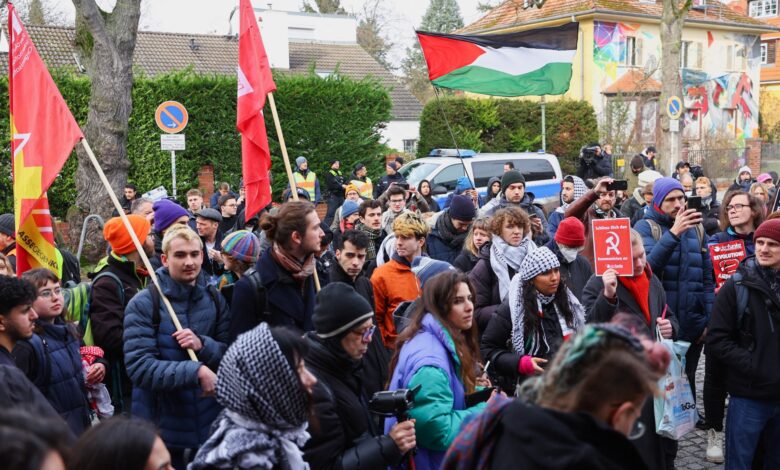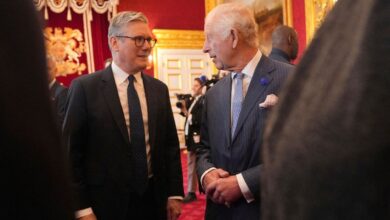German guiltwashing in times of genocide

On December 14, we, a group of students at Freie Universität Berlin, occupied a lecture hall in an act of solidarity with the Palestinian people. The occupation was the first of its kind in Germany. It was peaceful although a group of counterprotesters tried to disrupt it.
The reaction of the university, however, was to call the police to clear the protesting students. Twenty of us were detained, including myself. Although both the police and the university said there were no anti-Semitic attacks or discrimination at the protest, the latter tried to justify its actions in a subsequent statement with its policy of zero tolerance on anti-Semitism.
Last week, we received letters from the police notifying us that the university administration has pressed criminal charges against us for “trespassing”. Meanwhile, a petition has gathered more than 26,000 signatures calling for our expulsion. Federal Minister of Education Bettina Stark-Watzinger has also publicly called for the expulsion of “the most severe cases” while the Berlin Senate is planning to push through legislation to make such disciplinary action easier.
The events of December 14 and the subsequent legal and media harassment we have faced are happening amid a societywide assault on anyone expressing solidarity with the Palestinian people in Germany. There has been a relentless campaign to harass, scare, intimidate, silence, fire, dismiss and defund people and organisations who have dared go against the German government’s and institutions’ staunch support for Israel.
At the heart of this vicious persecution is the nationwide guiltwashing – or the cover-up of authoritarian state policies through the pretense of addressing Germany’s historical guilt for the Holocaust.
The message of the guiltwashers is clear: Germany alone is exceptional in its stance against anti-Semitism. Germany alone is fit to judge anti-Semitism. Germany, in opposing the exceptionalism of the Nazi era, is today exceptional once again but, of course, in a different and supposedly progressive way.
The sheer lack of self-awareness would be amusing if it were not so tragic and if its consequences were not so disastrous. Various Jewish authors and scholars have repeatedly pointed out the anti-Semitic nature of this guiltwashing approach.
“We have a form of anti-Semitism … that is not even addressed as anti-Semitism, and it is the collective silencing of Jewish voices that do not abide by the dominant discourse in Germany,” Emilia Roig, a Jewish French scholar and writer, said at a December event in Berlin.
According to Jewish writer and researcher Emily Dische-Becker, a third of those who have been “cancelled” in Germany for alleged anti-Semitism (i.e. expressing solidarity with the Palestinians) have been Jews, including descendents of Holocaust survivors.
Guiltwashing does not fundamentally care about the safety of Jews. Otherwise, it would not be pushing a discourse that is so recklessly increasing societal tensions at a time when hate crimes against Jews, Arabs and Muslims are spiking and when intercommunal solidarity is what is most necessary.
Indeed, guiltwashing is leaning in the direction of anti-Semitism – as well as anti-Arab racism and Islamophobia – because it operates on a superficial level and does not genuinely internalise the lessons of the past. It seeks to transpose anti-Semitism onto the Arab and Muslim communities to deny and cover up the persistence of German anti-Semitism in the social and political arena.
Guiltwashing does not allow Germans to take a principled stance against state terrorism, genocide and the systematic violation of human rights – something that should be the historical responsibility of any state, but especially so for the German state.
Instead, Germany has adopted a robotic, mindless, unidimensional reactive position. “Never again” is promoted in the narrowest sense – which is not altogether surprising considering the lack of education within Germany about its colonial past and other victim communities of the Nazi regime. It refuses to accept that never again should mean never again for genocide against any people.
Israeli government and military officials have repeatedly made clear their genocidal intentions openly and unabashedly. In any context, such repeated statements would be seen as the type of rhetoric that have typically accompanied historical episodes of genocide.
And yet German officials and public figures continue to ignore them. They have also disregarded the ruling of the International Court of Justice that Israel is plausibly committing genocide, and the practical unanimity of human rights groups and most of the international community on the apartheid character of Israel and its serial historical violations of international law.
Guiltwashing does not only mean acting due to a national guilt pathology. It is also a power tool. It postures as regret, but it works to further an ideal of German exceptionalism in the world and provide a cover of legitimacy for the German desire to remain a world power.
Guiltwashing allows Germany to maintain an expansionist foreign policy that reflects a racist view of the world and involves continued support for Israel and other brutal regimes throughout the Middle East. Until recently, it also included close relations with authoritarian Russia, willingly making the German economy dependent on Russian gas through the now infamous Nord Stream 2 project while the Russian army and mercenaries committed war crimes in Syria.
Guiltwashing also allows Germany to cover up the increasing structural and institutional racism against various minority groups. It now easily dismisses criticisms of anti-Arab and Muslim discrimination with its supposed anti-Semitism agenda.
German exceptionalism appears to have merely substituted one form of racism for another, making use of the more permissive international environment towards that anti-Muslim and anti-Arab prejudice today. It has basically created a replacement victim community.
A recent display at a carnival in Cologne illustrated well the dynamics of this process. It featured a figure of a woman wearing a keffiyeh with the well-known anti-Semitic caricatured nose, holding two dogs with Palestinian flag leashes named “hate” and “violence”. The transposition of an anti-Semitic trope onto what in the German mind constitutes Palestinianness represents perfectly the racist essence of guiltwashing.
Meanwhile, in a shocking example of historical revisionism, Berlin schools are being told to distribute leaflets describing the Nakba of 1948 as a “myth” – despite even Israeli lawmakers using the term.
Amid this societywide assault on international law, history, human decency and basic liberties, German academic institutions have done almost nothing. Although they should act as society’s moral conscience and oppose the current distorted, deeply pathological public discourse, they are shirking away from their responsibilities.
In meetings we have had with university officials, we have heard that speaking up would be too political or “polarised”, that it is beyond the mandate of academia and that the autonomy of universities is limited by their status as public institutions.
This appeasing stance is in sharp contrast to the historical lessons being taught at German universities about past failures of German institutions to push back against discourses of collective demonisation.
Until this state of affairs changes, the German state and institutions will continue to delude themselves that they are trying to atone for past sins. They will continue trying to escape responsibility for the consequences of that past by failing to recognise the multiple victimhoods which arose out of it.
The space we claimed last month was fundamentally a plea for a basic human recognition of the atrocities being committed in Gaza. But it was also an attempt to try to shake Germany awake, to force it to open its eyes to the blatant reality unfolding before its eyes, to force it out of its self-centred pathology of guilt and to recognise the reality for what it is.
In this context, we should emphasise clearly: Germany owe reparations not only to the Jewish people, but to the Palestinian people as well.
In a historical moment of genocidal violence, we will not be deterred in our mission by vexatious legal complaints, threats, harassment, assault or libel. We will continue our struggle no matter the costs.
An open petition of support for the 20 charged FU students can be found here.
A wider petition opposing the push for expulsions across Berlin universities can be found here.
The views expressed in this article are the authors’ own and do not necessarily reflect Al Jazeera’s editorial stance.



